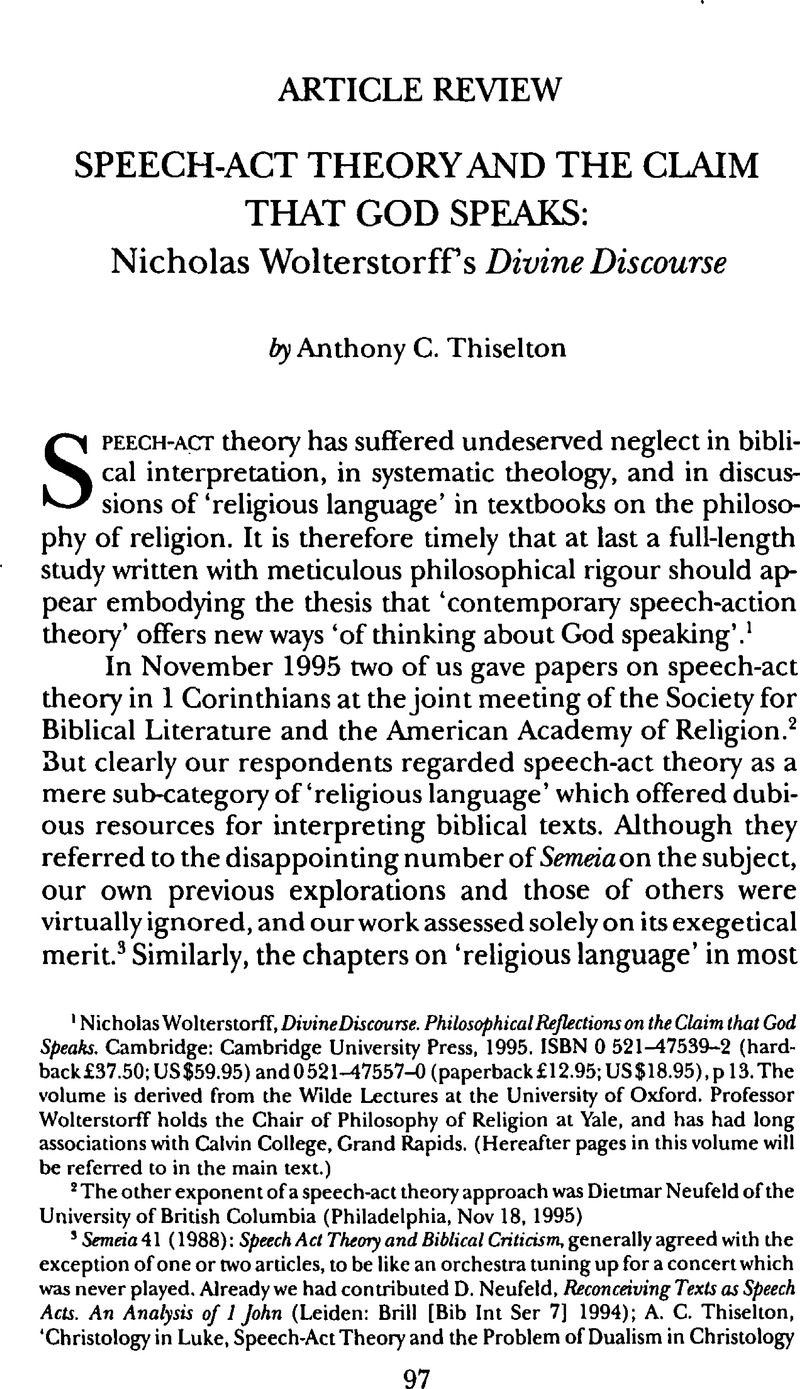Article contents
Speech-Act Theory and the Claim that God Speaks: Nicholas Wolterstorff's Divine Discourse
Published online by Cambridge University Press: 30 January 2009
Abstract

- Type
- Article Review
- Information
- Copyright
- Copyright © Scottish Journal of Theology Ltd 1997
References
1 Wolterstorff, Nicholas, Divine Discourse. Philosophical Reflections on the Claim that God Speaks. Cambridge: Cambridge University Press, 1995. ISBN 0 521–47539–2 (hardback £37.50; US $59.95) and 0521–47557–0 (paperback £12.95; US $18.95), p 13CrossRefGoogle Scholar. The volume is derived from the Wilde Lectures at the University of Oxford. Professor Wolterstorff holds the Chair of Philosophy of Religion at Yale, and has had long associations with Calvin College, Grand Rapids. (Hereafter pages in this volume will be referred to in the main text.)
2 The other exponent of a speech-act theory approach was Dietmar Neufeld of the University of British Columbia (Philadelphia, Nov 18, 1995)
3 Semeia 41 (1988): Speech Act Theory and Biblical Criticism, generally agreed with the exception of one or two articles, to be like an orchestra tuning up for a concert which was never played. Already we had contributed Neufeld, D., Reconceiving Texts as Speech Acts. An Analysis of 1 John (Leiden: Brill [Bib Int Ser 7] 1994)Google Scholar; Thiselton, A. C., ‘Christology in Luke, Speech-Act Theory and the Problem of Dualism in Christology after Kant’ in Green, J. B. and Turner, M. (eds) Jesus of Nazareth. Lord and Christ (Grand Rapids: Eerdmans and Carlisle: Paternoster, 1994) 453–472Google Scholar; New Horizons in Hermeneutics. The Theory and Practice of Transforming Biblical Reading (London and Carlisle: Harper Collins and Paternoster, and Grand Rapids: Zondervan, 1992) 16–19, 283–311 and 597–617; ‘The Parables as Language-Event: Some Comments on Fuch's Hermeneutics in the Light of Linguistic Philosophy’ SJT 23 (1970) 437–68; ‘The Supposed Power of Words in the Biblical Writings’ JTS 25 (1974) 283–99; and on Tyndale's use of speech-acts in Satterthwaite, P. E. and Wright, D. F. (eds) A Pathway into the Holy Scripture (Grand Rapids: Eerdmans, 1994) 107–142, esp 117–20Google Scholar
4 Cf for example Evans, D. D., The Logic of Self-Involvement (London: SCM, 1963)Google Scholar; Evans was J L Austin's pupil, and applied his approach to biblical texts on creation; High, D. M., Language, Persons and Belief (New York: Oxford University Press, 1967)Google Scholar; Brümmer, V., Speaking of a Personal God (Cambridge: Cambridge University Press, 1992)CrossRefGoogle Scholar and Theology and Philosophical Enquiry (London: MacMillan, 1981); Cf further Voelz, J. W., What Does This Mean? Principles of Biblical Interpretation in the Post-Modern World (St Louis: Concordia, 1995) 275–321Google Scholar. On first-person utterances cf also Thiselton, A. C., ‘The Logical Role of the Liar Paradox in Titus 1:12, 13: A Dissent from the Commentaries in the Light of Philosophical and Logical Analysis’ Bib Int 2 (1994) 207–223Google Scholar
5 Wittgenstein, L., Philosophical Investigations (Oxford: Blackwell, Eng and Germ 1967) sect 116Google Scholar
6 Austin, J. L. defined an illocutionary act as ‘the performance of an act in saying something as opposed to performance of an act of saying something’ [a locutionary act] or the performance of an act ‘by saying something … a perlocution’ (How to Do Things with Words [Oxford: Clarendon Press 1962] 94, 99 and 101)Google Scholar
7 Eg Searle, J. R., Speech Acts. An Essay in the Philosophy of Language (Cambridge: Cambridge University Press, 1969)CrossRefGoogle Scholar and Recanati, F., Meaning and Force (Cambridge: Cambridge University Press, 1987)Google Scholar
8 Thiselton, , New Horizons 293–298Google Scholar
9 Thiselton, , ‘Authority and Hermeneutics’ in Satterthwaite, and Wright, (eds) Pathway 130–141Google Scholar
10 Wolterstorff, N., Works and Worlds of Art (Oxford: Clarendon Press, 1980) 198–239.Google Scholar
11 Lindbeck, G., The Nature of Doctrine (London: SPCK, 1984)Google Scholar
- 1
- Cited by




